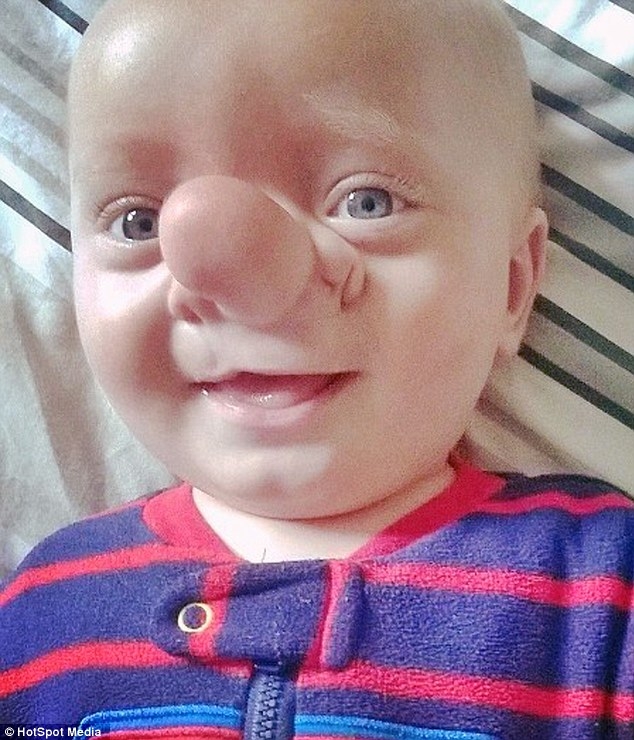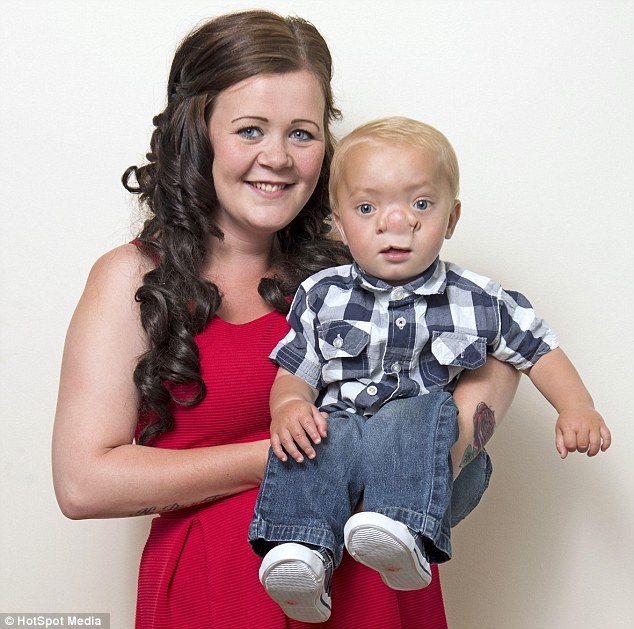 |
| Ollie Trezise, 21 months old, has a nose like the cartoon character Pinocchio. (Photo: Daily Mail) |
The 21-month-old boy has undergone many painful surgeries to close the gap in his skull .
The baby’s mother, Amy Poole – 22 years old, said that to her, Ollie has always been an angel and is still proud of him.
Ms. Poole was very hurt by the malicious words aimed at her son: “Once, a woman told me that he was strange and I should not have given birth to him. I almost burst into tears.”
During the 20-week ultrasound, doctors warned that there was a strange soft tissue growing on the baby’s face, but Ms. Poole was still shocked when her son was born at the University Hospital of Wales, in February. 2014: “When I held Ollie, I was so shocked I could barely speak. At first I didn’t know how to get through this. But I know I would love him as much as if there was nothing unusual on his face.”
 |
| Ollie Trezise and his mother. (Photo: Daily Mail) |
In November 2014, Ollie Trezise underwent a 2-hour surgery at Birmingham Children’s Hospital to remove excess brain fluid and reshape his nose. But that is not the final surgery.
Ms. Poole shared: “I was very scared when Ollie had to undergo such major surgeries. The line is very fragile, and I cannot bear the thought of losing my child.” However, doctors analyzed that without such surgery, baby Ollie was at risk of infection or meningitis. Therefore, the family agreed to surgery.
After surgery, Ollie had a huge zigzag scar on his head. The poor boy went through a lot of pain, but still smiled. “Ollie’s positivity gives me strength,” his mother said. Ollie has now fully recovered and is happily playing with his sister Annabelle, 4 years old.
According to Daily Mail, Dr. Martin Evans – who operated on the boy, said: “Cases like Ollie are very rare. Maybe only see one case per year. We are very pleased that the surgery was successful. Hope all the best things will come to the boy in the future.”
Encephalocele
Encephalocele is a rare birth defect, a neural tube defect, caused by deficient bone fusion, leaving a gap from which part of the brain protrudes.
Most encephaloceles are major birth defects and can be diagnosed before birth. However, in extremely rare cases, encephaloceles can be small and difficult to detect early.
There are many causes that lead to fetal brain herniation, including a lack of folic acid in the mother’s body during conception. In the UK, the incidence of this condition in newborns is around 1.7 per 10,000 births.
Neural tube surgery is a commonly used method to correct this condition in children because it is safe and does not cause paralysis or loss of the child’s ability to function.





